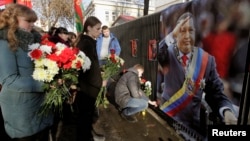LONDON —
In Europe, leaders have sent their sympathy to the family of Hugo Chavez and praised a president whose controversial 14 years in power won him both ardent supporters and detractors on the European continent.
In much of Europe, the death of Hugo Chavez was headline news on Wednesday.
In Spain, where his death was at the top of every newspaper, residents said they hope Venezuela will remain calm.
Paloma Ferrer, who works as a civil servant, said it will be a shock to the country but she hopes everything will calm down so there is peace.
Chavez died on Tuesday at age 58. Venezuelan officials said his death came after a long struggle with cancer.
Chavez, was a divisive leader in the international arena. He was fiercely critical of the United States, which he referred to as "the empire", and forged controversial ties with pariah states, including Iran.
But on Wednesday European leaders turned out to send their condolences.
The European Union released a statement praising Venezuela's social development and contribution to South America's regional integration.
In Germany, Foreign Minister Guido Westerwelle called the death of Chavez a "deep cut" for Venezuela. He said Germany feels compassion for the pain of Chavez' family and for the grief of the Venezuelan people.
British Foreign Secretary William Hague said he was "saddened" by the death of Hugo Chavez, who he said had left a "lasting impression" on his people.
And French President Francois Hollande said that while Chavez's positions were not shared by everyone, the late president had an undeniable wish to fight for justice and development.
Analyst Matt Ince from the Royal United Services Institute says global leaders are now looking ahead to the next election, which is due to take place within 30 days.
"A more pragmatic moderate government than the one we have seen under Chavez for the last 14 years would bode well not just for the U.S. but also for the wider West and we perhaps see a realignment of Venezuela in terms of its relations and almost a softening of relations," he said.
Venezuelan Vice President Nicolas Maduro, who was chosen by Chavez as his successor, is expected to face opposition from Henrique Capriles in the upcoming election.











